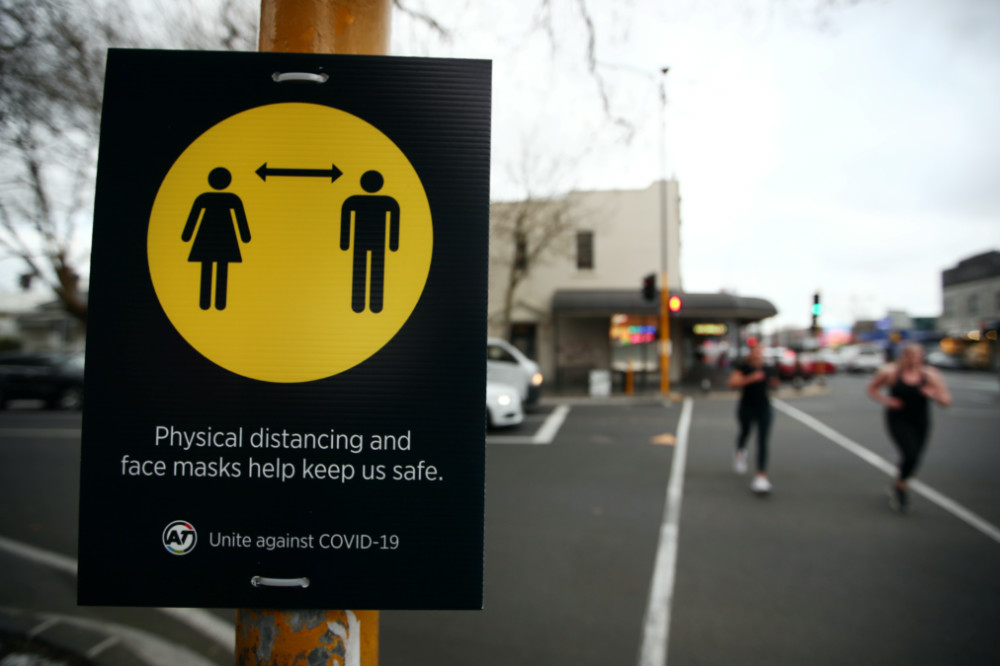Wellington, New Zealand
Reuters
New Zealand on Monday confirmed its first case of COVID-19 in the community in months in a 56-year-old woman, but said close contacts of the recently returned traveller had so far tested negative.
The woman, who returned to New Zealand on 30th December, had tested positive for the South African strain of the virus after leaving a two-week mandatory quarantine where she had twice tested negative, COVID-19 response minister Chris Hipkins said.

People jog past a social distancing sign on the first day of New Zealand’s new coronavirus disease (COVID-19) safety measure that mandates wearing of a mask on public transport, in Auckland, New Zealand, on 31st August, 2020. PICTURE: Reuters/Fiona Goodall/File photo.
No other community cases had been reported since the woman’s case was disclosed on Sunday and authorities said the source of the infection was probably a fellow returnee at the quarantine facility.
Authorities were looking at whether the virus was spreading through the ventilation and air conditioning systems in these facilities, Hipkins said.
New Zealand Health Chief Ashley Bloomfield said 15 people had been identified as close contacts of the woman and were being contacted.
However, her closest contacts, her husband and hairdresser, had tested negative, which was encouraging.
New Zealand, one of the most successful developed nations in controlling the spread of the pandemic, last recorded a community coronavirus transmission in November, according to the Health Ministry website.
A tough lockdown and geographical isolation helped the country of five million virtually eliminate the novel coronavirus within its borders.
New Zealand has had only 1,927 confirmed cases. But with the pandemic raging globally, more people are returning with infections, including the new variants, raising concerns the virus may spread in the community again.
The woman, who lives in Northland on New Zealand’s North Island, quarantined on arrival in a managed isolation facility in Auckland where several highly virulent COVID-19 cases have been recorded in quarantine facilities in recent weeks.
Bloomfield said the South African variant may be more transmissible but there was not yet enough research available.
Meanwhile, Australia on Monday approved the Pfizer-BioNTech COVID-19 vaccine for use but warned AstraZeneca’s international production problems mean the country would need to distribute a locally manufactured shot earlier than planned.
The country’s medical regulator was one of the first in the world to complete a comprehensive approval of the Pfizer-BioNTech vaccine, Prime Minister Scott Morrison said on Monday, noting it was a year since the first local coronavirus case was detected.
Vaccination of priority groups with the Pfizer vaccine is expected to begin in late February, at 80,000 doses per week, Health Minister Greg Hunt told reporters.
Pfizer had told the Australian Government it anticipated continuous supply but would provide global production guidance “in mid-February for March and beyond on a weekly basis,” he said.
The Australian rollout update comes after AstraZeneca Plc told European Union officials on Friday it would cut deliveries of its vaccine to the bloc by 60 per cent in the first quarter due to production problems.
Hunt said AstraZeneca had advised Australia the company has “had a significant supply shock and so that means we won’t have as much of that AstraZeneca international in March as they had previously promised”.
Australia will start CSL’s domestic supply of the AstraZeneca vaccine in March, earlier than planned, at one million doses a week, he said.
“The decision to pay a premium for an onshore, secure, sovereign vaccine manufacturing capacity via CSL, that puts Australia in a vastly more secure position than almost any other country in the world,” Hunt said.
Australia has set a target of four million vaccine doses by April.
The Pfizer vaccine has been provisionally approved by the Therapeutic Goods Administration’s for Australians aged 16 years and over.
Australia will administer the two doses of the vaccine to each recipient at the recommended time.
“You don’t start what you can’t finish, and finishing the job involves two doses,” said Morrison, adding a digital system would ensure people get two doses each.
However, he cautioned there are limits to what a vaccine rollout would mean for the country, with current border restrictions expected to remain in place.
Quarantine and border personnel, frontline health workers and aged care and disability staff and residents will be the first group to receive vaccines.





